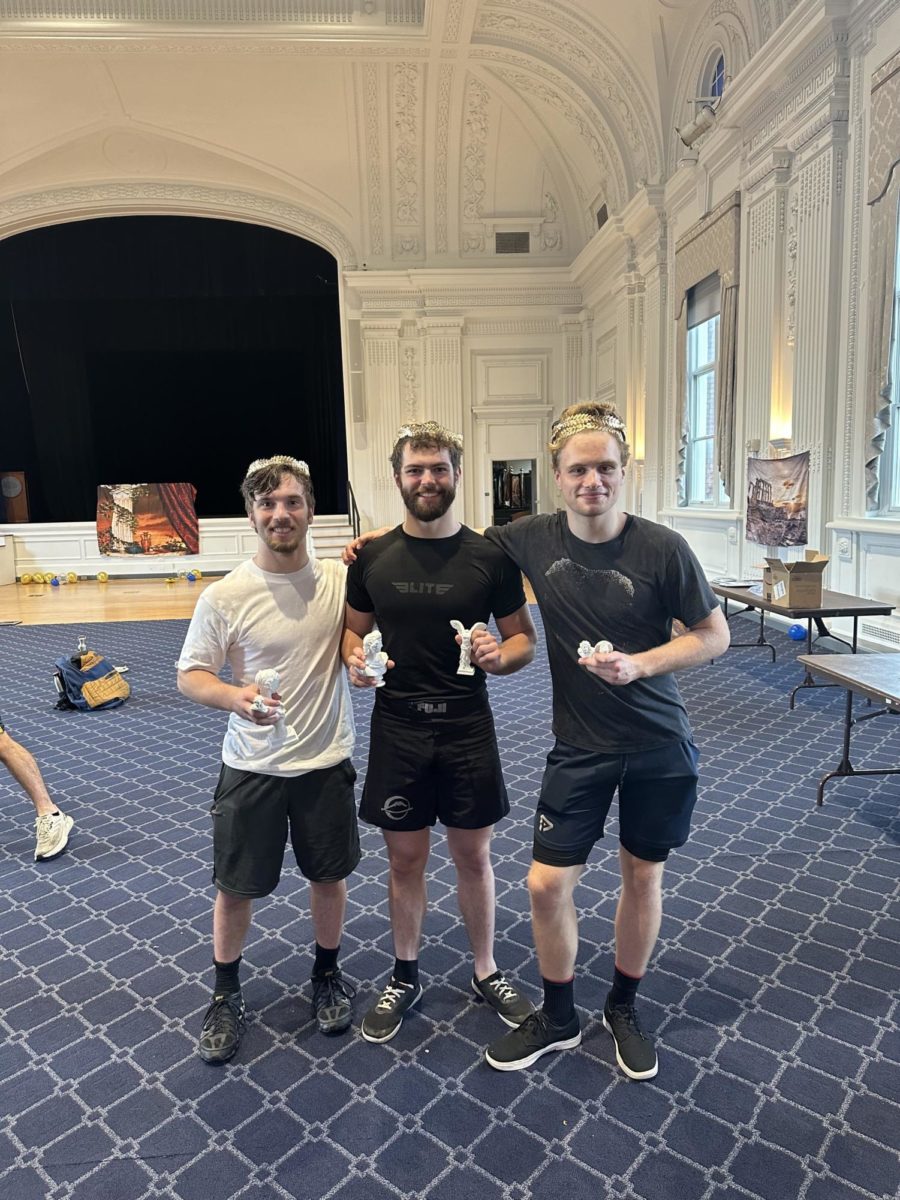On the 7th of the month of Pyanepsion (October), classicists, athletes and fans alike gathered in the Thwing Center Ballroom to witness and participate in the Olympic Games held by a collaboration of Judo Club and Atlantis, the classics club at Case Western Reserve University. Students competed for prizes in four different events: wrestling, long jump, shot put and sprint. Lunch was catered from Aladdin’s Eatery, a pankration exhibition was held and the top three winners of each event received glorious prizes.
The first competition was wrestling, where members of Judo Club wrestled in a Greek tradition stretching back to the funeral games in Book XXIII of Homer’s Iliad. In this format, it is permissible to choke and arm-lock opponents. Competitors earned points by forcing their opponent onto his back or off the mat, and the first wrestler to earn three points won the match. Some matches were slow and long while others were rapid and explosive. Fourth-year student Walker Cox fought valiantly to make it to the finals but was eventually defeated by graduate student Mitchell Arch. Second-year student Daniel Passmore finished in third.
In the long jump, which was open to all students, contestants leapt one after another onto a mat—as Alexander the Great leapt into the citadel of the Mallians—for a chance at glory. Cox redeemed himself in this event, earning a solid first place. Arch followed closely behind in second place and Passmore again earned a third-place finish.
Between the competitive events, a pankration exhibition was held by experienced fighters. These students sparred in a mix of boxing and wrestling before a captive audience. The pankration matches often began with bouts of quick jabs and eventually ended with the two fighters grappling each other on the floor. No winners were crowned since the pankration was simply an exhibition, but it greatly enhanced the Olympic spirit of the day.
In the following shot put event, students tried to throw a heavy metal ball as far as they could by twisting their bodies or thrusting it directly. The competition was fierce, and a great clamor resounded from the ball continuously striking the floor of the ballroom. An employee from Jolly Scholar walked upstairs and informed the organizers of the Olympics that the din produced by the balls slamming into the ground made it “sound like the ceiling was gonna fall in,” but the event was almost over by that point. Third-year student Joe Ferrari finished in first, followed by graduate student Jonathan Karkour in second and Cox in third.
The day ended with a sprint outside of Thwing in the chilly rain. Though this unpropitious omen from Zeus was interpreted disfavorably by the seer of evil things, everyone still ran with great alacrity by the side of Mather House. To the amazement of all, there was a three-way tie for first between Cox, fourth-year student Max Hudak and fourth-year student Teja Paladugu, who all finished in six seconds precisely. Perhaps such an occurrence is a first in the nearly three-millennia history of the Olympics.
The top three winners of each of the four events were crowned with a gold laurel wreath and received a bust of an ancient historical or mythological figure. In a stunning feat of athleticism, Cox won a crown for each event. Swift-footed Achilles would surely be proud.
“The event was exactly what I hoped it would be, minus the weather! I’m very proud of both our Atlantis and Judo exec boards for coming together to create this Ancient Olympic Games!” said fourth-year student Laila Ramadan, the president of Atlantis. “The wrestling and pankration events were incredible to watch, the guys really went all out and showed their skills. It was nice to see everyone participating overall in the shot put, long jump, and sprint events. Personally, the sprint was my favorite event.”
Inspired by Pindar, an ancient Greek lyric poet of odes to victorious athletes, third-year classics major Cason Willman composed the following sublime verses:
An Ode in the Style of Pindar:
Sīc certāmen alacre fuit tum Ātlantide coepit.
Primum audax Vādēns venit ambō in corpore sānus
Menteque sānus et occīdit fortēs eius hostēs.
Quisque genūque manūs utrius tum bracchia cēpit.
Vādēns victor erat! sed eum post vincit et audax.
Pancratium magnum sequitur, tam saltibus ingens.
Dein iacimus fortēs quoque vīribus ultima saxa.
Sīcut Ulixēs fēcit eās rēs sponte suā ōlim,
Nōs adeō ardōrem dēmōnstrāmus (quoque pār sum).
Cursus in hīs pluviīs factus (mīrābile vīsu!),
Atque citō subitō videō (quem?) currere sēsē:
Ēliās vīcit, quī celer est ut fulmine, Lailam!
Tigranocertā iūdice sī tēcum Enkidu certet,
Tigranocertā iūdice sē victum Enkidu dīcat.
Iuppiter in caelō facit omnia maxima celsō,
Nōs imitāre sumus cōnātī, forsan et rursus!
Vīta hominis sōlum exemplum: sibi fīat alacris!
English translation:
And thus did the lively contest, because of Atlantis, begin.
First up was the brave Walker, sound both in his body,
And in his mind, and he slew his strong foes.
Each one seized at the knee and the hands of the other, and then at the arms.
Walker was the victor! But then an even braver fighter bests him.
Followed the marvelous pankration, and a feat so great in leaping.
Then we throw the last stones, too, we strong ones with our might.
Just as Ulysses by his own will—long ago, “in those ancient days”—performed his deeds,
So do we demonstrate our passion (I, the author, as well).
Then the footrace was held in the rain—wonderful to see!
And whom do I see suddenly running quickly?
Why, it’s Elie, who is quick as the lightning, and he has defeated Laila in the footrace!
If Enkidu were to challenge you, with Tigranocerta as judge,
He would call himself conquered, with Tigranocerta as judge.
Jove in high heaven performs all his greatest deeds,
We tried to imitate his strength, and perhaps we shall try again one day!
For the life of man has one aim: may it become lively!



